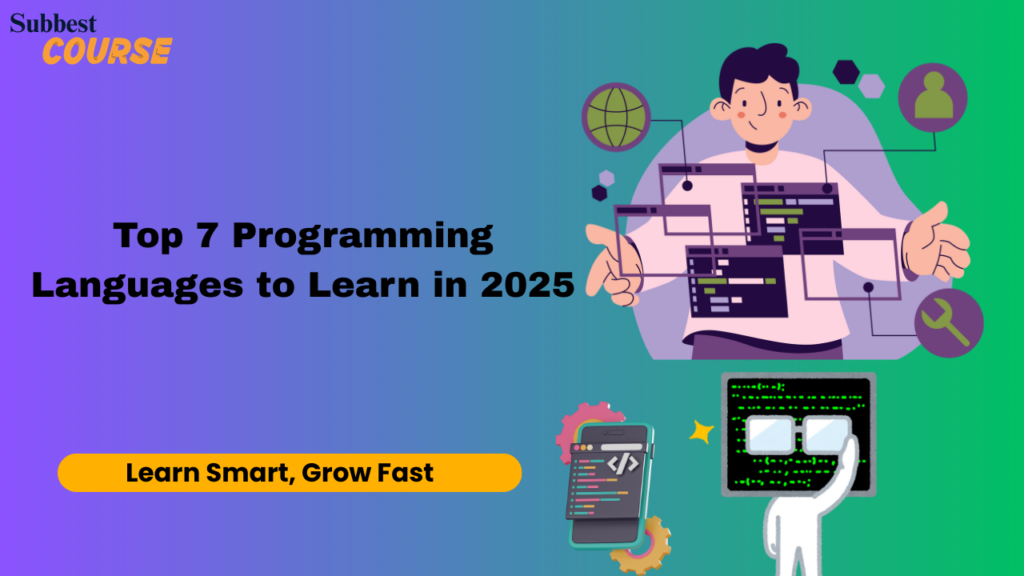Coding and programming have evolved rapidly, with new languages and frameworks emerging every year. In 2025, developers must stay ahead by learning in-demand technologies that power the future. This blog will explore the best programming languages, trends, career opportunities, and how to leverage coding skills for financial success.

- Python – Best for AI, ML, and automation.
- JavaScript – Dominates web development and front-end frameworks.
- Rust – Popular for high-performance and secure applications.
- Go (Golang) – Ideal for cloud computing and scalable systems.
- Swift – The go-to language for iOS app development.
- Kotlin – Preferred for Android development and cross-platform apps.
- C++ – Essential for game development and high-performance applications.
These languages are highly in demand, with job opportunities spanning AI, web development, cybersecurity, and mobile app development.
Top 6 Trending Technologies in 2025
AI-Powered Coding – Tools like GitHub Copilot and ChatGPT assist developers in writing optimized code faster.
Web3 & Blockchain – Decentralized applications (DApps) and smart contracts are growing.
Edge Computing – Faster data processing for IoT and AI applications.
No-Code/Low-Code Platforms – Allow non-developers to create applications easily.
Cybersecurity & Ethical Hacking – With increasing cyber threats, ethical hacking is more crucial than ever.
Quantum Computing – A revolutionary field impacting cryptography and complex problem-solving.
Best Career Paths in Programming
Software Developer – Build applications and systems in various industries.
AI & Machine Learning Engineer – Work on intelligent applications and automation.
Full-Stack Developer – Manage both front-end and back-end development.
Cybersecurity Analyst – Protect systems from cyber threats and hacking attempts.
Blockchain Developer – Create decentralized applications and smart contracts.
Cloud Engineer – Manage cloud platforms like AWS, Azure, and Google Cloud.
How to Make Money with Coding?
Freelancing – Platforms like Upwork, Fiverr, and Toptal offer great opportunities.
Creating & Selling Courses – Share knowledge on Udemy, Coursera, or your own platform.
Developing SaaS Products – Build subscription-based web applications.
Contributing to Open Source – Gain recognition and job offers.
Building Mobile Apps – Monetize with ads, subscriptions, or in-app purchases.
Game Development – Design and sell indie games or join major gaming studios.
Technical Blogging & YouTube – Share coding tutorials and earn through ads & sponsorships.
Best Free Resources to Learn Coding
🔹 freeCodeCamp – Hands-on coding exercises.
🔹 CS50 by Harvard – Best beginner-friendly computer science course.
🔹 MDN Web Docs – Perfect for web development.
🔹 LeetCode – Master coding interviews with practice problems.
🔹 The Odin Project – Comprehensive full-stack development.
🔹 MIT OpenCourseWare – University-level computer science courses.
Future of Coding: What to Expect?
AI-driven Development – AI tools will continue to streamline coding processes.
Increased Remote Work – More companies will hire remote developers worldwide.
More Automation in Development – Automating repetitive coding tasks will be a norm.
Rise of Cross-Platform Development – Flutter and React Native will dominate mobile development.
Stronger Focus on Security – Companies will prioritize security-first coding practices.
Additional Steps to Build a Strong Coding Portfolio
Create Personal Projects – Build unique projects to showcase your skills.
Contribute to Open Source – Collaborate on GitHub and other platforms.
Write Technical Blogs – Explain complex coding topics simply.
Participate in Hackathons – Gain experience and network with developers.
Engage in Competitive Programming – Platforms like Codeforces and AtCoder help sharpen skills.
Build a Strong LinkedIn & GitHub Profile – Show recruiters your contributions.
Take Internships & Apprenticeships – Gain industry experience before landing a full-time job.
Conclusion: The Future of Coding & How to Stay Ahead
Coding in 2025 and beyond is not just about learning a programming language; it’s about understanding industry trends, leveraging new technologies, and continuously improving your skills. Whether you are a beginner or an experienced developer, the demand for skilled programmers is at an all-time high.
Here’s a summary of key takeaways from this blog: